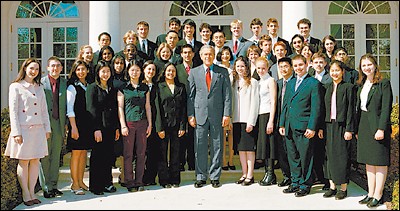Enrico Fermi, Albert Einstein, John von
Neumann, Niels Bohr: The legacy
of foreign-born scientists and mathematicians in America is well known.
They helped create the computer and the atom bomb, and
have
contributed a good portion of America's Nobel Prizes. Today, more than
half of all engineers with PhDs working here were born abroad, as were
45 percent of computer scientists and physicists with doctorates.
But according to a recent study, there's another, less
documented
benefit that many immigrants bring to math and science in this country:
their children. While doing some research on the Intel Science Talent
Search (the "Junior Nobel Prize"), Stuart Anderson noticed a high
number of finalists who seemed to have recent immigrant roots.
When the director of the National Foundation for
American Policy
delved deeper, the results were even more striking. Seven of the Top 10
award winners in this year's contest were immigrants or their children.
Of the top 40 finalists, 60 percent were the children of immigrants.
And a striking number had parents who had arrived on skilled
employment, or H-1B, visas.
"The study indicates there are significant gains to
immigration that haven't really been realized," says Mr. Anderson.
"There's been controversy over employment-based
immigration, but if
we had blocked these people from coming in, two-thirds of the top
future of math and science wouldn't be here, because we wouldn't have
allowed their parents in."
It's no surprise to most people who follow such
high-level
competitions, of course, that children of immigrants are well
represented there, but even participants say they are surprised at just
how significant the trend is.
"It seems like a lot of the parents who are immigrants,
they've just
had to work a lot harder to get where they are right now," says Divya
Nettimi, a finalist in Intel whose research on the molecular compound
myosin furthered the understanding of muscle contractions. "In India,
such a huge focus is placed on education, because jobs are so scarce
that it's a question of survival."
Her parents, both software engineers, came to the US
from India when
Divya was 9 months old, in large part because they wanted more
opportunities for their children.
Anderson says immigrant parents view the science and
math fields as
good for their children because they're objective. "You don't have to
worry about the subjectivity that can creep into fields like politics,
or law, that are based on family connections or what you look like," he
says.
There's also the fact that many of the parents
themselves are
working in those fields. In fact, the numbers that arrived on the
professional H-1B visas is strikingly high. Of the 40 Intel finalists,
for instance, 18 had parents who came on an H-1B visa - more than the
16 finalists who had American-born parents.
The visas are a political hot potato, however. Between
the security
concerns after 9/11 and economic concerns during the recession, there's
been significant pressure to reduce immigration and tighten the
visa-granting process.
A National Science Foundation report issued this year
noted that
denial of high-skilled visa applications nearly doubled from 2001 to
2003, and universities have said fewer foreign students are applying.
The report also gave a stark warning about how the
future of US
dominance in research and development could be affected if the country
continues to lag behind in educating its own citizens in the sciences.
And this spring, 25 academic and scientific organizations, including
the National Academy of Sciences and the Association of American
Universities, issued a joint statement about the need for changes to
the granting of visas.
So far, however, the discussion has centered only on the
immigrants
themselves - not their children. Yet the notion that many of these
children are successful has been established for some time, says
Marcelo Súarez-Orozco, codirector of immigration studies at New York
University.
What's striking about the data, he says, is how
"bimodal" it is,
with immigrants' children trending toward both ends of the spectrum.
Studies have shown that today, they're more likely than ever to end up
at places like Princeton, or Harvard, or MIT.
"But at the other end of this distribution, there are
large numbers
that are struggling," says Dr. Súarez-Orozco. Immigrant children arrive
with an edge over their American counterparts, Súarez-Orozco says, but
"over time there is a relative decline in terms of optimism and energy."
Among the top students that Anderson looked at, however,
that optimism and energy are still very much in evidence.
Andrei Munteanu - whose parents came from Romania when
he was 13,
and who got the idea for his research on data to predict asteroid
collisions from watching the movie "Armageddon" - is excited about
starting classes at Harvard, which he chose over MIT because he "likes
other things" in addition to math and science. Like Divya, he credits
his parents with a lot of his success. "They gave me not pressure," he
says, "but encouragement."
